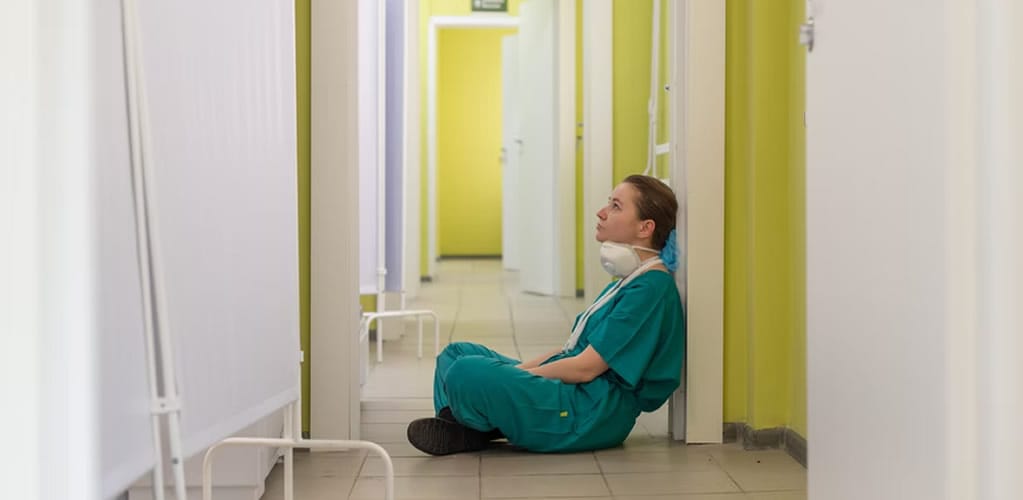Delaying care now will overburden healthcare much more!
Far too many COVID patients are still not seeking medical care early enough. Here is how you can get prepared.

Far too many COVID patients are still not seeking medical care early enough. Here is how you can get prepared.
First published: March 2022.
For most people, COVID will pass without an event. It will feel like a cold or self-limiting viral illness. Typically symptoms peak on day 2 or 3 and then improve thereafter. While cough can persist for a couple of weeks it should not worsen after the first few days.
For some, COVID progresses. Despite the rumours floating around, COVID does not solely progress in the elderly or vulnerable. Indeed, the increase in the risk of severe disease, death, and disability is thought to be the same for all adults.
Disease progression can take many forms. At the very least you should use the same judgment you did before the pandemic to decide when to seek medical care: worried = make contact. And you should stay vigilant for the possibility of Silent Hypoxia (see later in this article).
But first, you need to know when and how to test.
Too many people are presenting late due to not getting the right test at the right time. This is not helped by the reduced access to tests, as many governments surrender to COVID.
If you have any ‘viral’ symptoms you should consider undertaking a COVID PCR test, at the moment. In many countries just now, cold or flu-like symptoms is quite likely to be COVID, so seriously consider a PCR.
Like what you are reading? Please, support our work today!
Support PMP MagazineAntigen tests are not good enough for symptomatic infection. Over 1/4 of COVID patients will test negative on antigen (Lateral Flow) tests. This is crucial for decisions around self-isolation but it is more important for those eligible for anti-viral and antibody therapies. — Timing!
We have a number of treatments available for the early phase of COVID. Paxlovid is an antiviral and looks to reduce hospitalisation by 80% and mortality by at least that too. The side effect profile is good, but it is still a serious drug with complex interactions. — Only supervised!
There are a number of other treatments available. In those countries wealthy enough to access them there tends to be some criteria for usage. In the UK, it is generally the immune vulnerable. In the US, they have broader criteria, but it is prioritised. — Find out if you are eligible!
It is most unfortunate when a patient eligible for these treatments either realises too late – or has tested negative on antigen tests for some time – and then a PCR confirms COVID too late for these treatments. Typically these treatments must be taken by day 5 from symptom onset.
Please note how worthwhile taking these medications is if fully vaccinated (x 3), young(ish) and not in an ‘at risk group’ is currently unclear — I strongly advise against trying to source these medications yourself.
sign up to our FREE Briefings today.
Silent Hypoxia
Once you get COVID it is important to be aware of signs of complications or disease progression. You may have heard of Silent Hypoxia. It is another feature of COVID that makes it NOT like the flu.
Silent Hypoxia is where your blood oxygen level is low but you don’t feel it. Normally when oxygen levels fall you become short of breath and your respiratory rate increases. For a small but significant number of people with COVID they develop lung inflammation, drop their oxygen levels, but don’t feel it. But they do feel unwell!
Typically, severe fatigue predominates. For example, walking from the bathroom or up a flight of stairs makes you knackered (when it wouldn’t before). Pulse oximeters can measure your oxygen and are cheap and can be shared between communities.
For this reason, we advise measuring oxygen levels at home. Remember worsening can come on at any time! From day one through to day 14. It is a bit more common in those who feel worse around day 5 to 10.
Urgent medical care is needed if your oxygen level drops!
We are getting really good at treating patients who develop severe COVID. But the earlier you get to us if you have lung inflammation (COVID pneumonitis or COVID pneumonia), the easier it is to treat and the less likely you will get longer-term complications.
Risks also remain after COVID infection passes, especially for those more unwell. After any viral illness I think it is useful to take it easy for a couple of weeks (no bungee jumping!), eat well (veg), and stay active — Any new symptoms of concern, please do seek advice!
In some countries all adults over 35 with COVID are clinically assessed, others over 65, and others all clinical vulnerable cases are assessed and followed up. Sadly, some countries kind of leave you to get on with it and offer no assessment. Certainly those over the age of 35 and definitely those over the age of 50 or those with clinical risks should maintain a lower threshold for seeking medical care.
sign up to our FREE Briefings today.
Don’t delay care
I know it may feel like a burden on an already overburdened health service, BUT if you delay care then that will overburden healthcare much more!
So, 1. Get vaccinated.
2. Try and avoid getting infected.
3. If you have any viral symptoms get tested. PCR is better and a must for high-risk people.
4. Know if you are eligible for antivirals/antibody therapies.
5. If you get COVID, don’t panic... for most it will just resolve – even high-risk people.
6. Get a pulse oximeter! Keep an eye on your oxygen levels (it helps you sleep better knowing you are OK too!)
7. Seek help early! It is better for you and better for us.
8. Finally, the GOLDEN RULE: if you are worried and would normally make contact with your healthcare provider, then do it! We can’t help you if we don’t know you are unwell!
No billionaire owner. No wealthy shareholders. PMP Magazine only exists thanks to donations from our readers.
Support our independent journalismYou might want to save this animation and watch it when you get COVID:
A short animation by @VickiGSP may help:
— Dr Dan Goyal (@danielgoyal) January 11, 2022
pic.twitter.com/TtewYMe2a3
And this is a great app developed by a British GP. You can monitor loved ones from a distance and yourself. Results can be emailed to your care provider.

For clinicians, this review is helpful for identifying the deteriorating community covid patient:

Many politicians have given up, and a lot of people are pushing the “it’s over” and “it’s like the flu” narratives. It isn’t. And it’s not.
It is a lot less severe if vaccinated and if you have access to treatment when needed. We don’t have to give up! Just take a bit extra care!

What did you think of this article?
🤩 😀 🤔 😴 😮 😭 🤬 🤯
— AUTHOR —▫ Dr Dan Goyal, Medic, Internist, Academic. |
GET THEM INVOLVED: |
Sources
- Text: This piece was first published as a Twitter thread and turned into the above article on 22 March 2022 with the purpose of reaching a larger audience. It has been minorly edited and corrected, and published with the author’s consent. | The author of the tweets writes in a personal capacity.
- Cover: Unsplash/Vladimir Fedotov. (Licensed under a Creative Commons Attribution-ShareAlike 4.0 International License.)







[Read our Comments Guidelines]